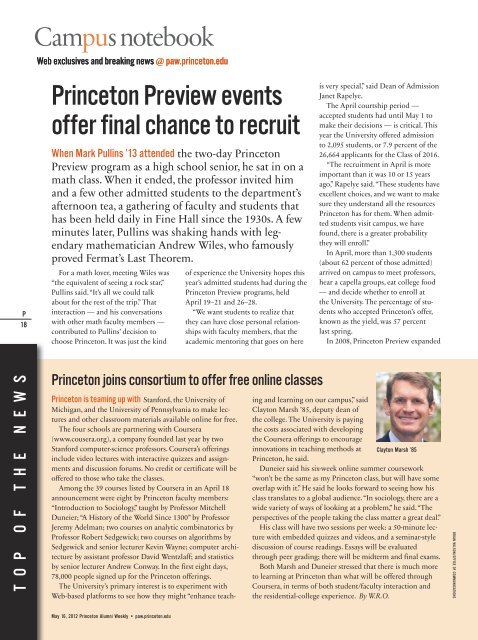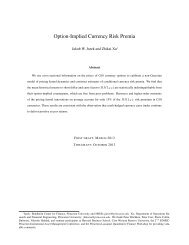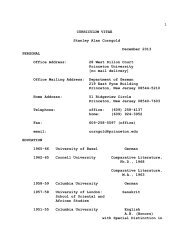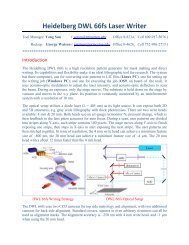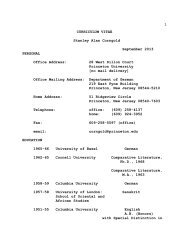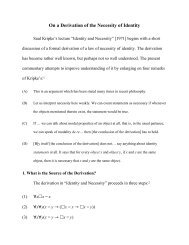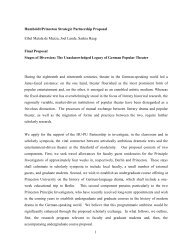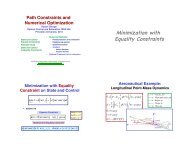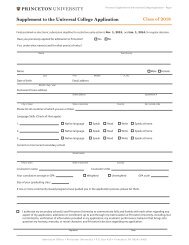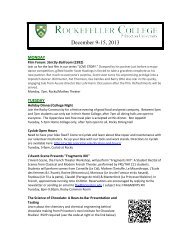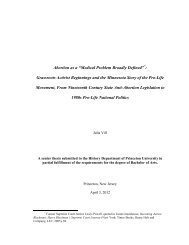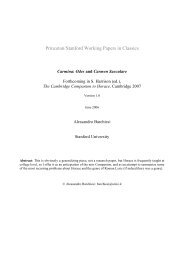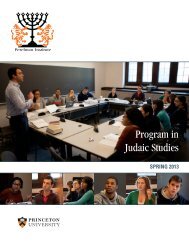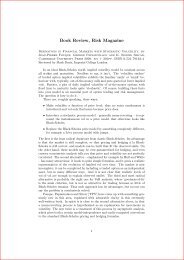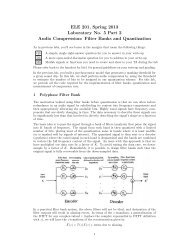Campaign residen the P -litics - Princeton University
Campaign residen the P -litics - Princeton University
Campaign residen the P -litics - Princeton University
You also want an ePaper? Increase the reach of your titles
YUMPU automatically turns print PDFs into web optimized ePapers that Google loves.
P<br />
18<br />
T O P O F T H E N E W S<br />
Campusnotebook<br />
Web exclusives and breaking news @ paw.princeton.edu<br />
<strong>Princeton</strong> Preview events<br />
offer final chance to recruit<br />
When Mark Pullins ’13 attended <strong>the</strong> two-day <strong>Princeton</strong><br />
Preview program as a high school senior, he sat in on a<br />
math class. When it ended, <strong>the</strong> professor invited him<br />
and a few o<strong>the</strong>r admitted students to <strong>the</strong> department’s<br />
afternoon tea, a ga<strong>the</strong>ring of faculty and students that<br />
has been held daily in Fine Hall since <strong>the</strong> 1930s. A few<br />
minutes later, Pullins was shaking hands with legendary<br />
ma<strong>the</strong>matician Andrew Wiles, who famously<br />
proved Fermat’s Last Theorem.<br />
For a math lover, meeting Wiles was<br />
“<strong>the</strong> equivalent of seeing a rock star,”<br />
Pullins said. “It’s all we could talk<br />
about for <strong>the</strong> rest of <strong>the</strong> trip.” That<br />
interaction — and his conversations<br />
with o<strong>the</strong>r math faculty members —<br />
contributed to Pullins’ decision to<br />
choose <strong>Princeton</strong>. It was just <strong>the</strong> kind<br />
May 16, 2012 <strong>Princeton</strong> Alumni Weekly • paw.princeton.edu<br />
of experience <strong>the</strong> <strong>University</strong> hopes this<br />
year’s admitted students had during <strong>the</strong><br />
<strong>Princeton</strong> Preview programs, held<br />
April 19–21 and 26 –28.<br />
“We want students to realize that<br />
<strong>the</strong>y can have close personal relationships<br />
with faculty members, that <strong>the</strong><br />
academic mentoring that goes on here<br />
<strong>Princeton</strong> joins consortium to offer free online classes<br />
<strong>Princeton</strong> is teaming up with<br />
Stanford, <strong>the</strong> <strong>University</strong> of<br />
Michigan, and <strong>the</strong> <strong>University</strong> of Pennsylvania to make lectures<br />
and o<strong>the</strong>r classroom materials available online for free.<br />
The four schools are partnering with Coursera<br />
(www.cousera.org), a company founded last year by two<br />
Stanford computer-science professors. Coursera’s offerings<br />
include video lectures with interactive quizzes and assignments<br />
and discussion forums. No credit or certificate will be<br />
offered to those who take <strong>the</strong> classes.<br />
Among <strong>the</strong> 39 courses listed by Coursera in an April 18<br />
announcement were eight by <strong>Princeton</strong> faculty members:<br />
“Introduction to Sociology,” taught by Professor Mitchell<br />
Duneier; “A History of <strong>the</strong> World Since 1300” by Professor<br />
Jeremy Adelman; two courses on analytic combinatorics by<br />
Professor Robert Sedgewick; two courses on algorithms by<br />
Sedgewick and senior lecturer Kevin Wayne; computer architecture<br />
by assistant professor David Wentzlaff; and statistics<br />
by senior lecturer Andrew Conway. In <strong>the</strong> first eight days,<br />
78,000 people signed up for <strong>the</strong> <strong>Princeton</strong> offerings.<br />
The <strong>University</strong>’s primary interest is to experiment with<br />
Web-based platforms to see how <strong>the</strong>y might “enhance teach-<br />
is very special,” said Dean of Admission<br />
Janet Rapelye.<br />
The April courtship period —<br />
accepted students had until May 1 to<br />
make <strong>the</strong>ir decisions — is critical. This<br />
year <strong>the</strong> <strong>University</strong> offered admission<br />
to 2,095 students, or 7.9 percent of <strong>the</strong><br />
26,664 applicants for <strong>the</strong> Class of 2016.<br />
“The recruitment in April is more<br />
important than it was 10 or 15 years<br />
ago,” Rapelye said. “These students have<br />
excellent choices, and we want to make<br />
sure <strong>the</strong>y understand all <strong>the</strong> resources<br />
<strong>Princeton</strong> has for <strong>the</strong>m. When admitted<br />
students visit campus, we have<br />
found, <strong>the</strong>re is a greater probability<br />
<strong>the</strong>y will enroll.”<br />
In April, more than 1,300 students<br />
(about 62 percent of those admitted)<br />
arrived on campus to meet professors,<br />
hear a capella groups, eat college food<br />
— and decide whe<strong>the</strong>r to enroll at<br />
<strong>the</strong> <strong>University</strong>. The percentage of students<br />
who accepted <strong>Princeton</strong>’s offer,<br />
known as <strong>the</strong> yield, was 57 percent<br />
last spring.<br />
In 2008, <strong>Princeton</strong> Preview expanded<br />
ing and learning on our campus,” said<br />
Clayton Marsh ’85, deputy dean of<br />
<strong>the</strong> college. The <strong>University</strong> is paying<br />
<strong>the</strong> costs associated with developing<br />
<strong>the</strong> Coursera offerings to encourage<br />
innovations in teaching methods at Clayton Marsh ’85<br />
<strong>Princeton</strong>, he said.<br />
Duneier said his six-week online summer coursework<br />
“won’t be <strong>the</strong> same as my <strong>Princeton</strong> class, but will have some<br />
overlap with it.” He said he looks forward to seeing how his<br />
class translates to a global audience. “In sociology, <strong>the</strong>re are a<br />
wide variety of ways of looking at a problem,” he said. “The<br />
perspectives of <strong>the</strong> people taking <strong>the</strong> class matter a great deal.”<br />
His class will have two sessions per week: a 50-minute lecture<br />
with embedded quizzes and videos, and a seminar-style<br />
discussion of course readings. Essays will be evaluated<br />
through peer grading; <strong>the</strong>re will be midterm and final exams.<br />
Both Marsh and Duneier stressed that <strong>the</strong>re is much more<br />
to learning at <strong>Princeton</strong> than what will be offered through<br />
Coursera, in terms of both student/faculty interaction and<br />
<strong>the</strong> <strong>residen</strong>tial-college experience. By W.R.O.<br />
BRIAN WILSON/OFFICE OF COMMUNICATIONS


